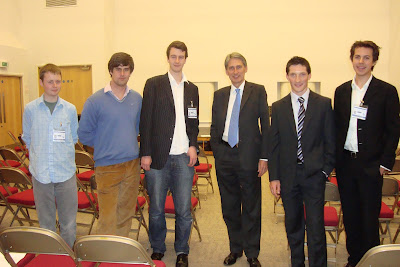 NUCA were privileged to arrange and enjoy the visit of Philip Hammond MP, Shadow Chief Secretary to the Treasury, for an open question and answer session at Nottingham Bluecoat School on Thursday 17th September, a few days before university term starts. Mr Hammond spoke to an audience of around a hundred GCSE and Sixth-form pupils at the school, as well as several NUCA members who were in attendance, on topics ranging from the economy to university education to the invasion of Iraq. He spoke convincingly and with clarity on these issues, but what stood out the most was a commendable honesty about the state of the nation’s finances: Over the past twelve years, the national debt has increased to almost 100% of GDP, and, according to Hammond, this is closer to 200% when the balance sheets of the recently nationalised banks are included in the calculations. Under Gordon Brown, the nation is borrowing £300,000 per minute, and even the Labour Party have begun to use the C-word to talk about future public spending: Cuts.
NUCA were privileged to arrange and enjoy the visit of Philip Hammond MP, Shadow Chief Secretary to the Treasury, for an open question and answer session at Nottingham Bluecoat School on Thursday 17th September, a few days before university term starts. Mr Hammond spoke to an audience of around a hundred GCSE and Sixth-form pupils at the school, as well as several NUCA members who were in attendance, on topics ranging from the economy to university education to the invasion of Iraq. He spoke convincingly and with clarity on these issues, but what stood out the most was a commendable honesty about the state of the nation’s finances: Over the past twelve years, the national debt has increased to almost 100% of GDP, and, according to Hammond, this is closer to 200% when the balance sheets of the recently nationalised banks are included in the calculations. Under Gordon Brown, the nation is borrowing £300,000 per minute, and even the Labour Party have begun to use the C-word to talk about future public spending: Cuts.
It wasn’t all grim economic news, however. Hammond rightly presented the Conservative party as the party of genuine opportunity, decentralisation and limited government. Appropriately enough, his constituency of Runnymede and Weybridge contains the site of the signing of the Magna Carta, the start of a great British tradition of opposing tyranny and excessive government interference; a tradition which has fallen somewhat out of vogue in the corridors of power under New Labour, but which we can hope to see revived under a Conservative administration. If the first Cameron term in office is going to be dominated by an agenda of fiscal responsibility and education reform, then the second will be about decentralisation. Hammond sees this as a tremendous possibility for the long-term as it could break the cycle of the last thirty years of British politics. Currently parties in opposition build up support locally, win power at the national level, lose local government support gradually, and then lose general elections. Local elections are used to register protests against the party in power in Westminster since local authorities have no power to speak of anyway, and decentralising local and regional issues to local and regional authorities will reinvigorate politics at these levels and radically change electoral dynamics at a national level.
(L-R:Philip Whitehead, Christopher Loftus, Hamish Stewart, Philip Hammond MP, Derek Hobbs (Assistant Headteacher), and Nick Allsopp)
Our thanks go to both Philip Hammond MP for speaking at the school and to Derek Hobbs (Bluecoat Assistant Headteacher) for being willing to organise and host the event.
Following the Q&A session, NUCA President Nick Allsopp interviewed Philip Hammond (http://www.youtube.com/watch?v=EITZRa__daE) and also saved the taxpayer a £10 taxi fare by giving him a lift to his next engagement in the city centre. As Tesco would have it, every little helps.



No comments:
Post a Comment